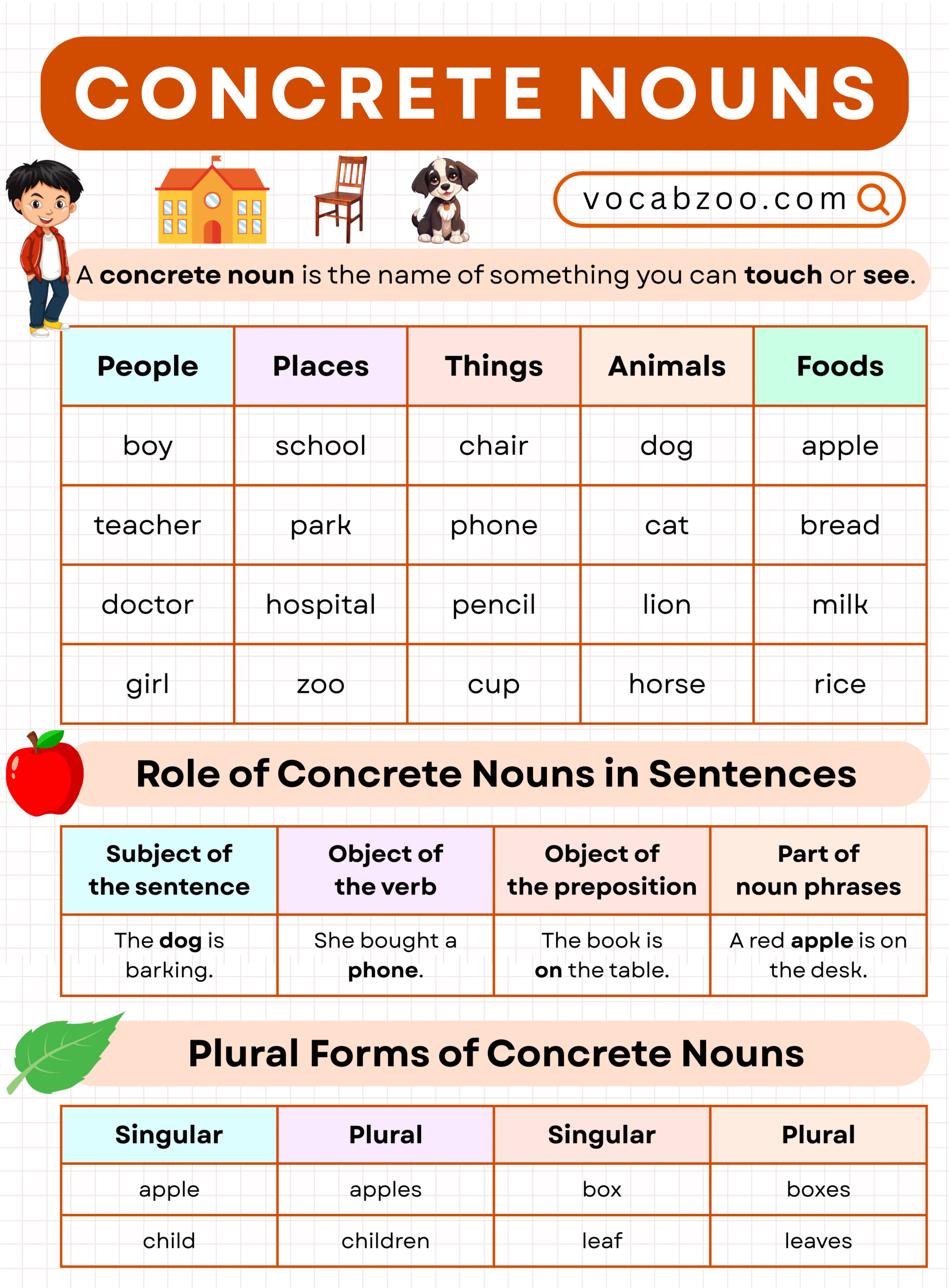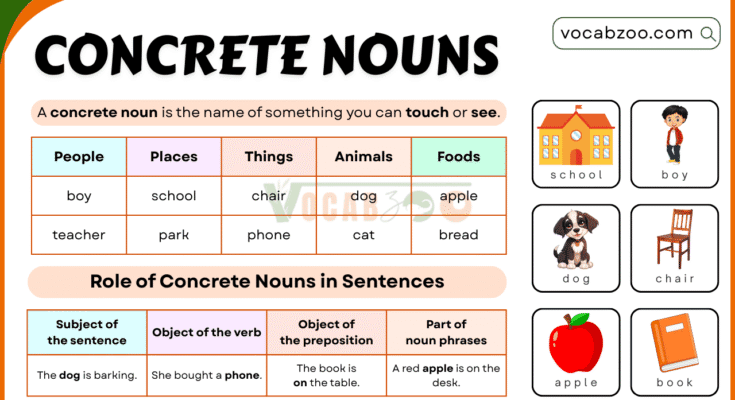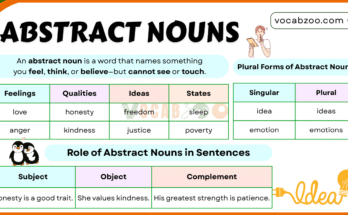Nouns are the building blocks of English, and understanding them makes learning the language easier. In this blog post, you will discover concrete nouns, which are words that name things you can see, touch, hear, smell, or taste. Learning concrete nouns helps you describe the world around you clearly, improve your communication, and make your speaking and writing more precise. With examples, you can quickly recognize and use concrete nouns in everyday English.
What is a Concrete Noun?
A concrete noun is a noun that refers to something you can see, touch, hear, smell, or taste. It names real and physical things.
Concrete nouns are easy to understand, because they talk about objects, people, and places we can experience with our senses.
Short Definition
A concrete noun is a word for something real, solid, physical, and visible.

Features of Concrete Nouns
Concrete nouns have some simple and clear features:
- They can be experienced with the five senses.
- They can be countable or uncountable.
- They can be common or proper.
- They are used in daily life and in describing real things.
Types of Concrete Nouns
1. Countable Concrete Nouns
These nouns can be counted as one or more.
Examples:
- apple
- chair
- book
- car
| Countable Noun | Meaning |
|---|---|
| apple | A fruit you can eat |
| chair | Something you sit on |
| bottle | A container for liquids |
2. Uncountable Concrete Nouns
These nouns cannot be counted individually.
Examples:
- water
- sand
- bread
- sugar
| Uncountable Noun | Meaning |
|---|---|
| water | Liquid we drink |
| rice | Food grain |
| wood | Material from trees |
3. Proper Concrete Nouns
These nouns name a specific person, place, or object.
Examples:
- London
- River Thames
- Mount Everest
4. Common Concrete Nouns
These nouns name general physical objects.
Examples:
- dog
- city
- phone
- tree
Concrete Noun vs Abstract Noun
| Concrete Nouns | Abstract Nouns |
|---|---|
| Refer to physical things | Refer to ideas or feelings |
| You can use senses to detect them | You cannot use senses |
| Example: table | Example: happiness |
Example in a Sentence:
Concrete: The table is brown.
Abstract: Her happiness shows in her smile.
Why Concrete Nouns Are Important in English
Concrete nouns help learners:
- Build clear sentences.
- Describe real objects in daily life.
- Improve communication and writing skills.
- Make descriptions strong and easy to understand.
Examples of Concrete Nouns in Daily Life
| People | Places | Things | Animals |
|---|---|---|---|
| teacher | school | table | dog |
| doctor | park | chair | cat |
| farmer | hospital | bottle | horse |
| student | library | phone | cow |
| driver | shop | bag | sheep |
| nurse | kitchen | book | rabbit |
| artist | garden | pencil | bird |
| chef | market | laptop | fish |
| builder | office | spoon | tiger |
| child | station | blanket | goat |
Complete Lists of Concrete Nouns
Common Objects
- desk
- window
- phone
- bottle
- key
- spoon
Food Items
- bread
- milk
- cheese
- pasta
- orange
Nature
- rock
- river
- leaf
- cloud
- mountain
Household Items
- sofa
- bed
- lamp
- plate
- blanket
Transport
- bus
- train
- bicycle
- motorbike
- boat
Sentences Using Concrete Nouns
- The dog is playing in the garden.
- She bought a new phone yesterday.
- The river flows behind my house.
- I placed the keys on the table.
- Fresh bread smells wonderful.
Practice Table
| Sentence | Identify the Concrete Noun |
|---|---|
| The bird is singing. | bird |
| Put the bag on the chair. | bag, chair |
| Water is boiling. | water |
| I see a rainbow. | rainbow |

Concrete nouns are simple and useful because they refer to real, touchable, and visible things. Understanding them helps learners build strong vocabulary, create clearer sentences, and improve communication skills. By practising with the lists, tables, and examples above, you can easily remember and use concrete nouns in everyday English.
FAQs
What is a concrete noun in simple words?
A concrete noun is a word for something you can see, touch, hear, smell, or taste. It names real and physical things.
How do I know if a noun is concrete?
If you can experience it with your senses, the noun is concrete. If you cannot, it is usually abstract.
What are three common examples of concrete nouns?
Examples include table, dog, and water. All can be seen or touched in real life.
What is the difference between concrete and abstract nouns?
Concrete nouns refer to physical things. Abstract nouns refer to ideas or feelings, such as love or honesty.
Can concrete nouns be countable or uncountable?
Yes. Many concrete nouns are countable, like chairs. Some are uncountable, like rice or sand.
Are people and places concrete nouns?
Yes. Names of people, animals, and places are concrete because they exist physically.

